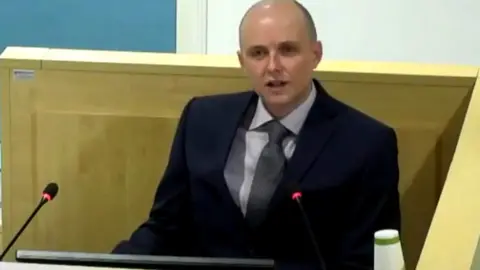Manchester Arena Inquiry: Surgeon defends Saffie-Rose treatment
 Family handout
Family handoutA hospital surgeon has defended the emergency treatment given to the youngest victim of the Manchester Arena bombing, Saffie-Rose Roussos.
Some experts at the public inquiry have said doctors could have tried an extra operation to try to save the eight-year-old, who was in cardiac arrest.
But consultant Paul Farrelly said her injuries meant a major emergency procedure "would not" have saved her.
He told the inquiry: "We couldn't see any positive outcome from doing it."
Dr Farrelly, from the Royal Manchester Children's Hospital, said doctors decided against a procedure called a "resuscitative thoracotomy" because "we couldn't see how, in that situation, she could have survived… and come out of cardiac arrest at all".
Twenty-two people were killed and hundreds more injured when Salman Abedi detonated a bomb at the end of an Ariana Grande concert on 22 May 2017.
Saffie-Rose, from Leyland, Lancashire, arrived at hospital in an ambulance about 55 minutes after the explosion.
 Manchester Arena Inquiry
Manchester Arena InquiryThe inquiry heard she was unresponsive and had "grave injuries".
She went into cardiac arrest as she arrived in the hospital's resuscitation room and, despite the efforts of the emergency trauma team, died about 15 minutes later.
Dr Farrelly told the court: "We were aware there were, more than likely, injuries that we... couldn't have been aware of, that would've added to her injury burden.
"We couldn't see a way that we could've managed them all in a way that she would have survived."
A thoracotomy is not life-saving in itself and is a temporary measure in resuscitating a patient before moving on to repair an issue, Dr Farrelly added.
The inquiry also started to hear evidence about the extent of Saffie-Rose's injuries and the court was warned the evidence would be "graphic" and "deeply distressing".
Pathologist Dr Philip Lumb, who carried out the post-mortem examination, detailed the series of terrible injuries that Saffie-Rose suffered in the blast.
The inquiry was told she had 69 individual injuries across her body, most caused by metal shrapnel contained in the bomb. The court was told these caused severe internal injuries.
The hearing had previously heard there was a "difference of opinion" between medical experts over whether Saffie-Rose could have survived if she had had different treatment.
The inquiry continues.

Why not follow BBC North West on Facebook, Twitter and Instagram? You can also send story ideas to [email protected]
